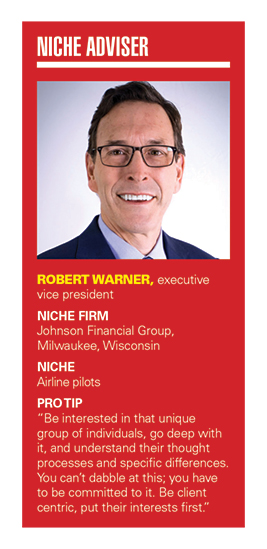

Bob Warner has been developing his niche advisory practice for so long he doesn’t even refer to it as a niche, he calls it an “affinity market.” By whatever name, Warner’s 24-year focus on airline pilots stands out as a model for how niche practices can develop and thrive.
Warner, executive vice president at Johnson Financial Group in Milwaukee, Wisconsin, discovered his niche in 1997 when the firm he co-founded, Cleary Gull Advisors, hired an adviser who previously worked as a commercial airline pilot.
Back then, before the airlines and the unions agreed to some changes to the way pilots saved for retirement, most of the financial planning opportunities didn’t start until after the pilots entered retirement.
Thus, Warner and his team, which has since grown to a dozen people at the $15 billion RIA, started building relationships with pre-retired pilots by offering pro bono advisory services.

“Prior to 2015, almost all clients were retired,” Warner said. “But after 2015, the major airlines revamped and upgraded their 401(k) plans and, as a result, it created a whole new market for us to be able to work with active pilots because we can advise them on their retirement savings while they’re still working.”
The original model had Warner and his team reaching out to pilots when they were near the mandatory retirement age of 60, which was extended to age 65 in 2016.
“We would help them plan for retirement, then at retirement the plan assets would roll into an IRA that we would then manage,” he said. “We would start working with clients at age 55, but unless they had outside assets, we had nothing to manage and charge a fee on. And once they retired, they ideally would contract us.”
With more flexible retirement plan options for pilots, Warner said it is now possible for him to charge advisory fees while the pilots are still working.
The pilot niche represents about $900 million across 850 families at Johnson Financial Group, and Warner said his client base spreads across 44 states with 99% of clients "outside of our drivable geography.”
In the early days of developing the niche, the team would host a couple of dozen seminars each year all over the country in an effort to get the word out to pilots based in major cities. But as the business has expanded and the reputation has grown, Warner said he relies heavily on referrals from other pilots.
“There’s an upside of relying on your reputation, but there can also be a downside because news can travel very quickly,” he said. “Bad news travels like wildfire, so if you screw up, or someone thinks they were treated unfairly by you, these pilots all have coffee together and sit in the pilot lounge together. But that’s also the good thing because if you do really well and treat them well, they tell other pilots about you.”
Like most niches, working with airline pilots requires specific knowledge and capabilities.
“The airline industry cycle of boom or bust has been challenging for pilots historically,” Warner said. “When things go well, they go well, and when they don’t go well, they’re out of business. Their retirement plans are always at risk because when airlines go under pilots can lose a portion of their pensions.”
Pilots are also very fraternal and, in many ways, homogenous, which also presents a different set of challenges and opportunities from an advisory perspective.
“They’re union, so when one union and one airline cuts a new contract it forces the other carriers to fall into line and match it,” Warner said.
In terms of how other advisers can find their own niche, Warner the key is to focus on what you can do to help a particular group of people be successful, “and don’t just focus on what would make you successful as an adviser.”
“Be interested in that unique group of individuals, go deep with it, and understand their thought processes and specific differences,” he added. “The focus is needed, because you can’t be all things to all people the way most of us started our businesses.”

Chasing productivity is one thing, but when you're cutting corners, missing details, and making mistakes, it's time to take a step back.

It is not clear how many employees will be affected, but none of the private partnership’s 20,000 financial advisors will see their jobs at risk.

The historic summer sitting saw a roughly two-thirds pass rate, with most CFP hopefuls falling in the under-40 age group.

"The greed and deception of this Ponzi scheme has resulted in the same way they have throughout history," said Daniel Brubaker, U.S. Postal Inspection Service inspector in charge.

Elsewhere, an advisor formerly with a Commonwealth affiliate firm is launching her own independent practice with an Osaic OSJ.
Stan Gregor, Chairman & CEO of Summit Financial Holdings, explores how RIAs can meet growing demand for family office-style services among mass affluent clients through tax-first planning, technology, and collaboration—positioning firms for long-term success
Chris Vizzi, Co-Founder & Partner of South Coast Investment Advisors, LLC, shares how 2025 estate tax changes—$13.99M per person—offer more than tax savings. Learn how to pass on purpose, values, and vision to unite generations and give wealth lasting meaning
